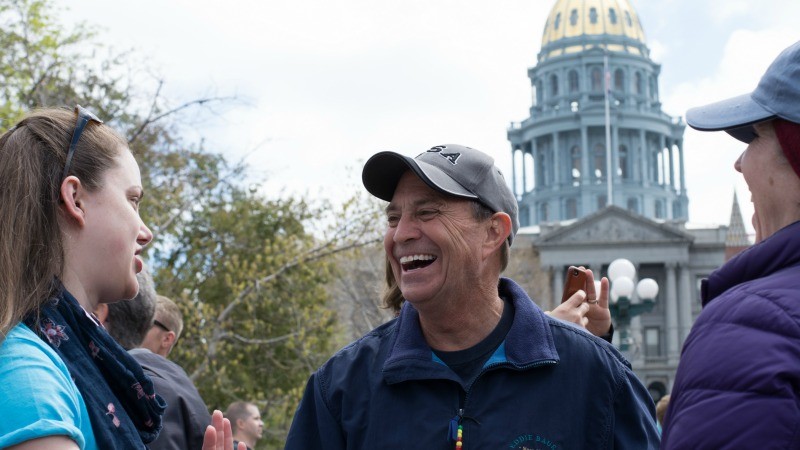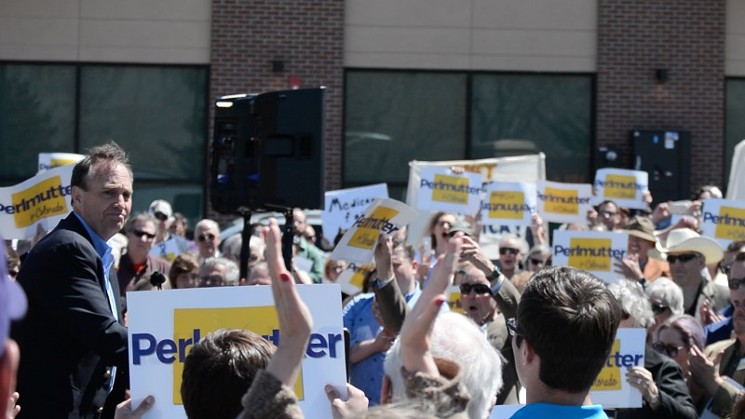Although the election won't take place for more than a year, the field is already growing crowded, as is our collection of Q&As with the assorted hopefuls. The first major Democrat to announce was former state senator Mike Johnson, followed by ex-Colorado treasurer Cary Kennedy. On the Republican side, both 18th Judicial District DA George Brauchler and businessman (and nephew of Mitt Romney) Doug Robinson have thrown their respective hats into the ring.
Our chat with Perlmutter took place earlier this month. During the conversation, Perlmutter spoke with noteworthy directness about his decision to seek out the governorship rather than stay in Congress to keep fighting the agenda of President Donald Trump, as well as the role ex-senator Ken Salazar's choice to remain on the sidelines played in this process.
Perlmutter also outlined what he sees as the most important issues facing Colorado, revealed how he's gone from opposing Amendment 64, the 2012 measure that legalized limited recreational marijuana sales, to pushing legislation to help the industry operate as would any other business, and made an argument for why voters would be better served by casting their lot with a reliable, longtime public servant than by seeking out a flashy political outsider.
Here's what he had to say.
Westword: How long have you been thinking about running for governor?
Ed Perlmutter: I've thought about it on and off for a number of years. It might have been kind of a fleeting thought. But I really started thinking about it seriously on November 8, when Donald Trump won the White House. At that point, looking at both the Congress and the White House, and watching it closely over the next few months, it was clear the real checks and balances that exist between the states and the federal government — those checks and balances really don't exist between Congress and the White House. That really got me thinking about where I could be the most effective in providing my public service.
That suggests that you fear the Democrats in Congress right now will be unable to push an agenda or have a positive impact during the Trump years. Is that the way you feel, or am I overstating that?
I think you're overstating it. I think there is resistance that the Democratic Party can provide in the Congress. But for me, I think my experience and my desire to move things forward really focused me on coming back to the state and running for governor.
You take pride in being bipartisan. Is that a rare commodity in the U.S. Congress? And do you feel like there's a greater possibility of bipartisanship right now at the state level?
Yes, it's getting rarer in the Congress right now. There are still places for bipartisanship in Congress. In the NASA bill, for the National Aeronautics and Space Administration...I'm on the science committee, and we passed a major bill that the House and the Senate passed and the president signed. I have a couple of sections of mine that were passed last year and kind of rolled into the big bill. So there are places for bipartisanship still. But it's getting more difficult, and there's some rancor that I think we don't have in the State of Colorado. Not to say there aren't some political fights in Colorado, but it's a more bipartisan setting.
There's the perception that Democrats and Republicans are more willing to work with each other in the Colorado general assembly. But Governor Hickenlooper talked about calling for a special session because he felt that legislators had allowed partisanship to prevent important things from getting done. [Hickenlooper subsequently announced that he'd set aside the special session idea.] How would you tackle those kinds of situations as governor?
There are always going to be places of disagreement, and I think Governor Hickenlooper was probably right in seeking a special session, especially on the transportation bill that was stymied to some degree. That's a big issue — infrastructure's a big issue in this state. And I think the governor does a good job in working with both sides. I think that's a special talent and skill that I have, in working with both sides to advance the ball for everybody. So I would work with both sides. I know there are some folks who are going to be very intransigent and just stubborn. But I feel I can do a good job in working with people to find a path where everybody can say, "Okay."
Some folks see the kind of stubbornness you describe as a positive — that you're willing to stick by your principles no matter what, without compromise. Do you feel that way about some issues? Or, in a general way, are you more interested in trying to find middle ground?
I like to find a middle ground. That's sort of my nature. There are going to be some places where you'll have to say, "Sorry, you and I don't see eye to eye on this issue, and we're going to have to take a vote." But my nature is to find a way that advances the interests of all concerned. Some may get a little more in this instance and some may get a little less, and vice versa. But my nature is to try and move things forward with everybody.
You mentioned earlier that the election of Donald Trump as president was a real motivator in terms of you getting serious about running for governor. But your announcement followed the decision of former senator Ken Salazar not to run. Did that factor into your decision? And would you likely have run anyhow even if Senator Salazar had declared his candidacy?
Ken and I had a number of discussions after November 8. I would have liked to have seen him run. And when he decided not to, then I decided I would run. That's what happened.
Had he decided to run, would you have stayed in Congress?
I would have stayed in Congress, or I would have...I would not have run for governor.
Is there the possibility that you would have concluded the current term as representative and perhaps looked toward a future gubernatorial race?
I don't know. I'd say that calls for a lot of speculation. At that point, I was looking at what was happening in the Congress, where Ken was headed and thinking about where I could be most effective. He and I talked a lot. I had encouraged him. He encouraged me. And when he chose not to, I said, "Okay, I'm running."
What will be your top priorities as governor? What are the main issues, from your perspective?
As always, a good economy and good jobs that pay good wages. That's number one. Number two helps facilitate that, and that's infrastructure. Good roads, bridges, bikeways, waterworks, the electrical grid, telecommunications. Infrastructure is another high priority. And then there are a whole variety of things that need to be considered: environment and public lands, education, investment in education, health care. And the legislature did a good job on the provider fee in the last week or two. I was very pleased to see that. If the Republican Congress continues to move forward on the Republicans' health-care bill, which in my opinion is just terrible, there's going to be a lot more work for the state to have to grapple with, because the federal government is just going to shove off a lot of Medicaid responsibility. They're going to increase premiums five times on people from fifty to 64 and basically say to the states, "You're in charge of pre-existing conditions." That will put a heavy burden on all the states, and certainly Colorado, if that bill is to pass.

Ed Perlmutter during a recent campaign appearance in Grand Junction.
Courtesy Ed Perlmutter for Governor
The bill as it's coming out of the House really puts a big burden on the state. There are some things the governor can do and that the state can do to avoid the full brunt of it. But there is a lot of off-loading of expense from the federal government to the states if that bill is to pass. The bill cuts millions of people off of Medicaid and it raises all these premiums, then changes how pre-existing conditions are covered, which is really the heart of the Affordable Care Act. People with pre-existing conditions and disabilities couldn't be discriminated against under the ACA. That's being changed under what the Republicans have proposed, and the cost of that will be placed upon the states. And then under the Republicans' bill, the savings would go to tax cuts that the Republicans are going to be proposing in their tax-reform bill.
That would seem to really hamstring states like Colorado. As governor, will you be better able to navigate these negative or worst-case scenarios because of your background at the federal level?
The answer to your question is yes. And I think Colorado has done a good job in preparing itself with the database that's been developed as to costs — really trying to keep a good eye and a good idea on what the costs are for [a] knee operation in this part of the state at this hospital versus a knee operation in another part of the state at another hospital. So we've got a good database that really provides a lot of information. It helps our state manage costs, because we have good information that maybe some other states don't have. There's a real transparency in the cost of their various procedures and bills. That will help us as a state.
I think I can help us, too, having served in the federal government, in being able to navigate this path. And I think that's one of the things that distinguishes me. The experience I have at the federal level coupled with the service in the state Senate and having been a lawyer representing all kinds of businesses, including health-care clinics and medical practices. I think I'm in a position to help guide the state along with all the other experts that we have.
You mentioned jobs and the economy, and growth is a particularly hot topic, especially in the Denver area. As governor, how would you try to strike a balance between not enough growth and too much?
We've got to first delineate between the Front Range and the Denver metro area, which has enjoyed a strong economy, and other parts of the state, the rural parts of the state, that really haven't seen the same successes. In the Denver area, we have some offshoots of a very good economy, and those are congestion on our highways and very high prices for our housing. And so we've got to deal with affordable housing; that's one of the things I'd want to deal with as governor. And as I talked about earlier, infrastructure is very key to making sure that people can get around this state and that goods and services can go back and forth so our economy remains good. I have been through a number of ups and downs, of cycles of the economy in the State of Colorado. I actually carried a land-use management bill in 2001 and 2002 when I was a state senator. It dealt with water conservation, dealt with making sure we weren't just sprawling all over the place. I can bring some of the things I learned in that context to the job of governor. I think the economy will eventually cool, and that will cool down some of the growth.
That's the Front Range. Out-state, I would like to see some of that growth take place over on the Western Slope or in the northeast or southeast parts of the state. I just took a tour of Routt County, Moffat County, Rio Blanco County, Mesa County and Garfield County, where the concern was not enough jobs, not enough growth. They did have cost problems, especially in Glenwood. But because the oil and gas industry has been down, the mining industry's been down, they've been relying on that. I'd like to see some of the good economy spread, certainly to the Western Slope and the plains. I think there are ways to do that, by helping the Western Slope diversify its economy, maybe by having more outdoor-recreation companies and outdoor-manufacturing businesses over there. Cory Gardner and Scott Tipton had an idea that I thought was a good one — moving the headquarters of the Bureau of Land Management from Washington over to, say, Grand Junction, so that we spread some of the growth across the state. I think that would benefit all of us.
Your mention of the disparities between the metro area and the rest of the state brings up the criticism heaped on Democrats for supposedly not paying enough attention to rural areas during the last election. Is that something that would be a particular focus for you as governor — being governor of the whole state, and not just Denver and the urban corridor?
Yes. We have the most beautiful state in the nation, and it's one of the most beautiful places in the world. I want to see all of our state enjoy success, and I will spend a lot of time traveling the state, meeting with people, talking with them whether they have the same political opinions as I do or not, whether they look at the world the way I do or not. Because I want to see the rural parts of the state succeed along with everybody else. I think it's important for whoever the governor is, and for elected officials generally, whether they're Democrats or Republicans, to get out and about and talk to all of the people who live in the state, and to visit all different parts of the state. I think John Hickenlooper's done a pretty good job of that. Bill Ritter did, too, and Bill Owens got out and about. But the guy who I would follow, and who would be more like me than the others, is Roy Romer, who had this thing he called "Dome on the Range." He would take cabinet members, and they would go to different parts of the state and set up shop so people could come and talk to him — and they wouldn't have to come to Denver to do it.
I do something similar to that as a Congressman. It's called "Government in the Grocery." I go to a different grocery store every other week or every third week, on a Saturday, usually, and set up shop in a Safeway or in a Natural Grocers or a Sprouts, so people can come and talk to me about whatever's on their minds, whether it's something major, like peace in the Middle East, or their mother didn't get a Social Security check. I would like to take that kind of approach in traveling the state and meeting with folks, whether they're in the metro area or one of the far corners of the state.
Another topic you've discussed with us in the past is marijuana and your membership in the Cannabis Caucus. What is the thrust of the Cannabis Caucus right now?
The thrust is really to make sure that the federal laws and the state laws are aligned and not in conflict with one another — and they are in conflict today. Twenty-nine states have some level of either recreational marijuana or medical marijuana. And then I want to say another seven or eight states allow for the use of cannabis oil for seizures. At the same time, the Controlled Substances Act says cannabis and THC is illegal for all purposes, medical or otherwise. So we're working to try to align the laws. I've got a bill that deals with banking and financial services. It says if the state has a regulatory structure in place, then that state will be exempt from some of the federal banking restrictions that make it difficult for marijuana businesses to have a credit card or a payroll account or a checking account, so that they can operate as a normal business and not build up these big piles of cash that really make them a target for robbery, assault and battery and that kind of stuff.
The banking situation has been allowed to linger by the federal government for years, and it doesn't seem likely to be resolved anytime soon. If it's still in place when you're governor, what could you do to improve the situation other than lobby the federal government to make a bill like yours law?
Lobbying the federal government would probably be the most direct thing you could do. There have been efforts to set up a bank or banking system that services the cannabis industry. But eventually, the marijuana sector has to go into the Federal Reserve system. So there are some potential changes in technology, with bitcoin and blockchain and some other things, that might allow for some system of finance to develop. But that's far off. I think lobbying is number one.
Number two would be to work with our delegation and make sure they have at their fingerprints the information I have, especially on the banking side of this. And I would hope that the administration...we've gotten some kind of conflicting reports out of the Trump administration. From the White House, they're going to proceed with the Obama approach, which is if a marijuana business and a bank are going through a certain protocol, then they're a very low priority for any kind of law enforcement efforts. But the Attorney General has had a more restricted view of that. So at the end of the day, I think we need to change the law at the federal level.
Were you for or against Amendment 64? And in the wake of its passage, how do you think Colorado's marijuana industry has worked out?
I was opposed, but I kind of took a poll of my wife, our six kids and my parents. From the ten of us, I took a poll, and I realized it was going to pass when it was seven to three in favor of it. But because it's the law — it's in our Constitution — I think for the most part it's worked out okay. There are issues about how's it working with the federal government and are the taxes being distributed in the way we'd like to see. But generally it's worked out okay. As a consequence, I want to make sure the federal law and the state law are in synch.
Right now, you're the biggest-name candidate among the folks who've declared for governor. We seem to be in an environment where being the best-known person is not necessarily seen as a positive. It seems that a lot of voters out there are looking for a fresh face, as well as someone wanting to shake things up. How do you convince the voters of Colorado that supporting someone with your level of experience is the right way to go?
I think a lot of people, starting on November 8 with the election of Donald Trump, started going, "Okay...." We want to have somebody who has experience, has demonstrated a strong work ethic, can get along with people of different political opinions, so there's certainty and some consistency and progress, and not just a roller coaster of problems. Folks want to know they can go to bed, and when they wake up the next morning, things are generally moving in the same direction.
So I think I bring experience. My work ethic has always been strong. I think I'm somebody who's approachable and accessible.Having been a lawyer representing all types of businesses, having served in the state Senate on the judiciary committee and water committee and transportation committee and insurance committee, and having served in the Congress on the Homeland Security committee, Science, Space and Technology, the rules committee and financial services, I think that experience, coupled with the fact that I've won in a very kind of purple district of Jefferson County and Adams County — I think those will help me win this election. It's no slam dunk, but I like my chances.














